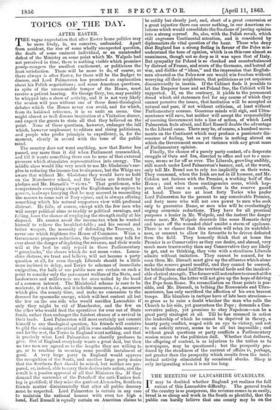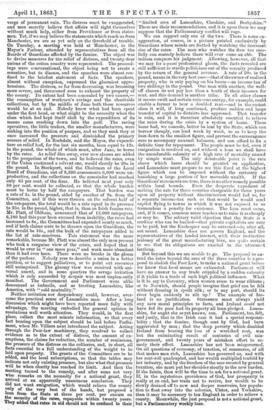THE MEETING OF LANCASHIRE GUARDIANS.
may be doubted whether England yet realizes the full
extent of this Lancashire difficulty. The general trade of the country is so prosperous, the revenue comes in so easily, bread is so cheap and work in the South so plentiful, that the public can hardly believe that one county may be on the
verge of permanent ruin. The distress must be exaggerated, and men secretly believe that affairs will right themselves without much help, either from Providence or from states- men. Yet, if we may believe the statements which reach us from Manchester, we are as yet only on the threshold of trouble. On Tuesday, a meeting was held at Manchester, in the Mayor's Parlour, attended by representatives from all the Boards of Guardians affected by the famine. The object was to devise measures for the relief of distress, and twenty-four unions of the cotton country were represented. The proceed- ings were conversational, the object being not to create a sensation, but to discuss, and the speeches were almost con- fined to the briefest statement of facts. The speakers, almost without exception, expressed the gloomiest appre- hensions. The distress, so far from decreasing, was becoming more severe, and threatened soon to exhaust the property of the county. Its extent had been concealed by two causes,— the consumption of workmen's savings and the charitable collections, but by the middle of June both those resources would be at an end. Nobody knew what had been spent under the first head, or what might be the necessity when the class which had kept itself aloft by the expenditure of its means came crashing down into the gulf. The saving operatives, the little traders, the smaller manufacturers, were sinking into the position of paupers, and as they sank they at once increased the pressure and diminished the primary sources of relief. In Rochdale, said the Mayor, the expendi- ture on relief had, for the last six months, been equal to 12s. in the pound, the whole of which must, after June, be borne by the rates. As relief dies away, ever new classes are added to the pauperism of the town, and he believed the rates, even if the Union continued a solvent one, would shortly be 20s. in the pound. In Stockport, said the Chairman of the Local Board of Guardians, out of 8,200 assessments 6,000 were un- productive, and the collections on the remainder had reached only 65 per cent. of the dues. He believed next year only 50 per cent. would be collected, so that the whole burden must be borne by half the ratepayers. That burden was a rate of 5s. in the pound, aided by another of 9s. from the Committee, and if this were thrown on the solvent half of the ratepayers, the total would be a rate equal in its pressure to 25s. in the pound, higher, that is, than an Irish famine rate. Mr. Platt, of Oldham, announced that of 13,000 ratepayers, 6,180 had this year been excused from inability, the rates had increased to 8s., the Committees had expended nearly as much, and if both claims were to be thrown upon the Guardians, the rate would be 16s., and the bulk of the ratepayers added to the list of rate-receivers. This statement was the more remarkable, because Mr. Platt was almost the only man present who took a sanguine view of the crisis, and hoped that it would be over in "one more year," and work more abundant than it had ever been. There were no breaks in the gloom of the parlour. Nobody rose to describe a union in a better position, or to suggest palliatives, or to point out resources still unimpaired. The gloomy view was received with uni- versal assent, and in some quarters the savage irritation which is only succeeded by despair was most unpleat antly manifest. The Government and Parliament were alike denounced as imbecile, and as treating Lancashire, like America, with "cold neutrality."
Neither irritation nor despondency could, however, over- come the practical sense of Lancashire men. After a long discussion which might have been reported more fully with advantage, the meeting embodied the general opinion in resolutions well worth attention. They would, in the first place, collect the most minute information, so that every fact bearing upon the subject should be laid before Parlia- ment, when Mr. Villiers next introduced the subject. Acting through the Poor-law machinery, they resolved to collect evidence as to the extent of distress, the amount of ex- emptions, the claims for reduction, the number of remissions, the pressure of the distress on the collieries, and, in short, all facts essential to a full understanding of the weight to be laid upon property. The grants of the Committees are to be added, and the local subscriptions, so that the tables may indicate not only existing pressure, but also what that pressure will be when charity has reached its limit. And then the meeting turned to the remedy, and after some not very wise remarks on the necessity for a national grant, they arrived at an apparently unanimous conclusion. They did not want emigration, which would relieve the county only of the very best of the hands, but proposed a lean from the State at three per cent. per annum on the security of the rates, repayable within twenty years. They added that rates in aid should not be confined to their "limited area of Lancashire, Cheshire, and Derbyshire." These are their recommendations, and it is upon these we may suppose that the Parliamentary conflict will rage. We can support only one of the two. There is some ex- oneration, of course, in a picture painted exclusively by Guardians whose minds are fretted by watching the incessant rise of the rates. The man who watches the flow too care- fully can scarcely believe there will ever come an ebb. The tedium conquers his judgment. Allowing, however, all that we may for a quasi professional gloom, the facts revealed are still sufficient to startle politicians out of the serenity produced by the return of the general revenue. A rate of 20s. in the pound, means in the very best case—thut of the owner of realized property, who is only paying on his house—an income-tax of two shillings in the pound. One man with another, the well- off classes do not pay less than a tenth of their incomes for rent. and this demand is another tithe. To all other classes it means swift and certain ruin—no energy, for example, could enable a farmer to bear a doubled rent—and in the easiest class it will, if long continued, produce sudden and large transfer of capital to districts less oppressed. That transfer is ruin, and it is therefore absolutely essential to relieve the rates during the crisis by a system of loans. These loans had, we concede, better be lent by the State, which can borrow cheaply, can lend week by week, so as to keep the loan down to the smallest figure, and prevent the extravagance sure to accompany unusual balances, and can afford to fix a definite time for repayment. The people must be fed, even if emigration is resolved on, and without a loan we shall have the unendurable calamity of a high rate of mortality caused by simple want. The only debateable point is the rate above which loans should be granted on application, and Lancashire must prepare to see this fixed at the highest figure which can be imposed without the certainty of banishing a large portion of her moveable wealth. If the Guardians' statements are true, there is no other remedy possible within local bounds. Even the desperate expedient of making the rate for three counties chargeable for three years upon all property without discrimination would fail us, for a separate income-tax such as that would be would send capital flying to towns in which it was not exposed to so tremendous a penalty for existence. The loan must come, and, if it comes, common sense teaches us to raise it as cheaply as may be. The solitary valid objection that the State is a creditor who can be bullied—that private capitalists are sure to be paid, but the Exchequer may be outvoted—is, after all, not sound. Lancashire does not govern England, and the representatives of the landed interest, with their instinctive jealousy of the great manufacturing hive, are quite certain to see that its obligations are exacted to the uttermost farthing.
But beyond this we are unable to go. The proposal to ex- tend the rates beyond the area of the three counties is a pro- posal to abolish the Poor Law, to make a national grant before we know that local means are exhausted. Parliament will have no answer to any trade crippled by a sudden calamity if it yields to a trade of such high political influence. What is it to say to Coventry, when women cease to wear ribbons ; or to Norwich, should people imagine that grief can be felt without dressing in spoilt silk; or to any port, should its river begin suddenly to silt up ? The example of Ire- land is no justification. Statesmen must always yield any save moral principles to facts, and Ireland could not have fed its poor bad its property all been pledged. Lanca- shire, for aught she as yet knows, can. Parliament, too, felt, and justly, that in the Irish case it had a special responsi- bility ; that the famine, though sent by God, had been aggravated by man ; that the deep poverty which disabled Ireland from bearing the loss of a wretched root, was but the culminating result of centuries of evil mis- government, and twenty years of mistaken effort to re- medy their effect. Lancashire has not been misgoverned. On all questions of economy, of taxation, of commerce, of all that makes men rich, Lancashire has governed us, and with her rent-roll quadrupled, and her wealth multiplied tenfold by her industry, and by the freedom of the seas secured by general taxation, she must put her shoulder stoutly to the new burden.
If she faints, then will be the time to ask for a national grant.
If, in the. mysterious providence of God, her prosperity is really at an end, her trade not to revive, her wealth to be slowly drained off to new and deeper reservoirs, her popula- tion to float away into the colonies, Ulster, and Yorkshire, then it may be necessary to tax England in order to relieve a county. Meanwhile, the just proposal is not a national grant, but a Parliamentary weekly loan.































 Previous page
Previous page